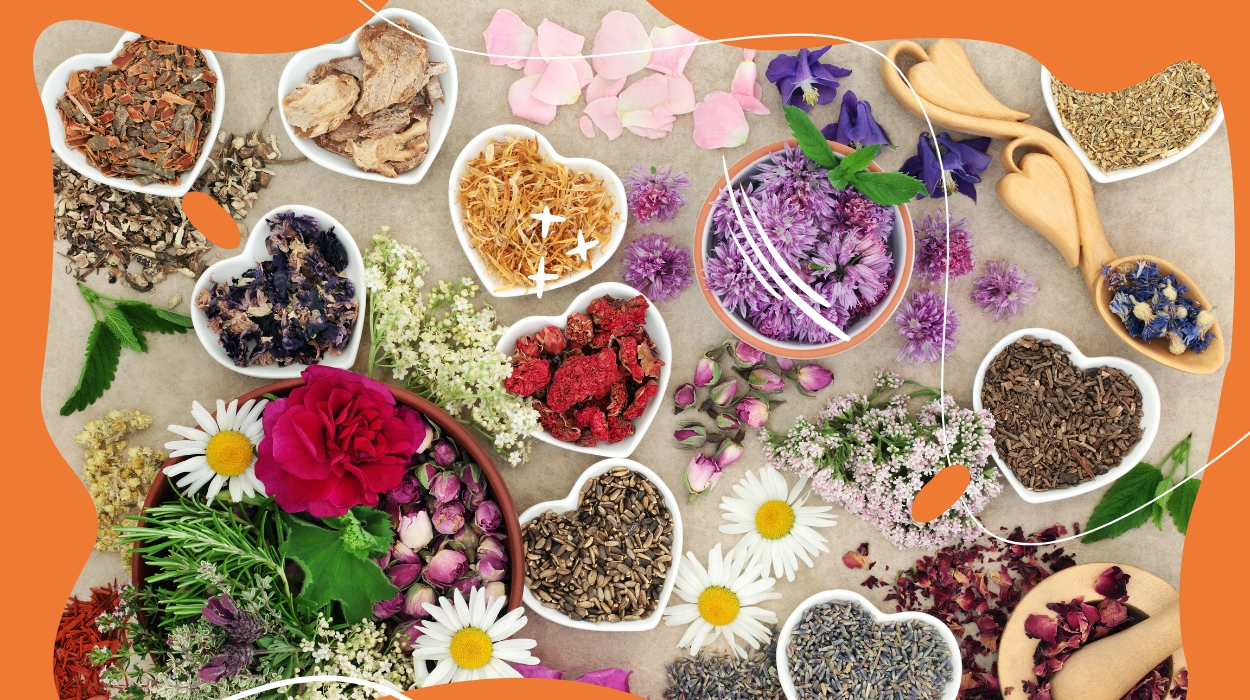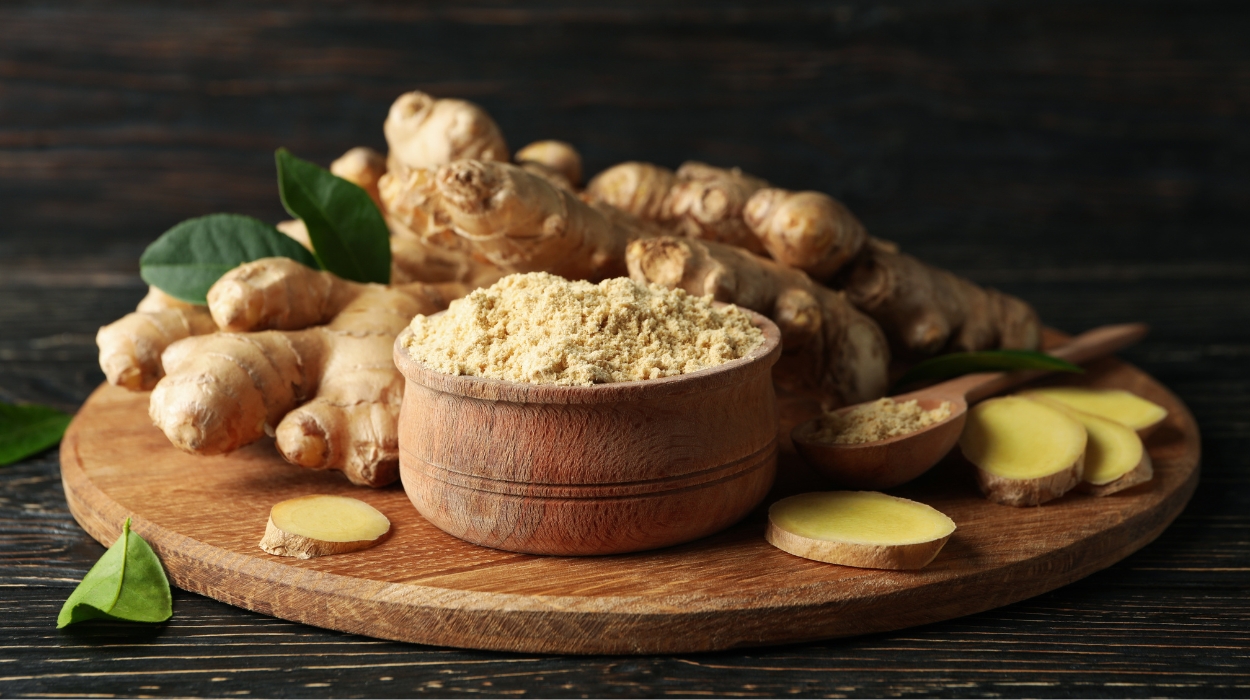 Expert's opinion
Expert's opinion
Expert's opinion
The article is a subjective view on this topic written by writers specializing in medical writing.
It may reflect on a personal journey surrounding struggles with an illness or medical condition, involve product comparisons, diet considerations, or other health-related opinions.
Although the view is entirely that of the writer, it is based on academic experiences and scientific research they have conducted; it is fact-checked by a team of degreed medical experts, and validated by sources attached to the article.
The numbers in parenthesis (1,2,3) will take you to clickable links to related scientific papers.
Herbs For Weight Loss 2024: 7 Herbs To Help You Lose Weight

Regardless of your view, you cannot deny that losing weight requires dedication, consistency, and commitment. It doesn’t happen overnight. So, from an objective point of view, it is safe to say that losing weight is pretty challenging.
For some, the weight loss journey involves changing to a healthy lifestyle, mainly the dietary aspect. Meanwhile, others may attempt to increase excess fat burning by visiting the gym regularly. But do you know there is another way to lose weight naturally?
Of course, yes! And it is through herbs. So, this piece will provide information on herbs for weight loss efforts. Are they safe? Do they affect your body weight? Or, besides weight loss, do you even stand to gain anything else from them? Well, let us find out.
7 Best Herbs For Weight Loss
- Fenugreek
- Ginger
- Carob
- Black Pepper
- Devil’s Claw
- Fennel
- Turmeric
Which Are The Best Herbs For Extreme Weight Loss?
Fenugreek
Fenugreek, or Trigonella Foenum-graecum, is an annual plant cultivated as a semi-arid crop globally, with India being a major producer. Though people use fenugreek as a vegetable or spice, it can also promote healthy weight loss. But how exactly does it do so?
Various research[1] reveals that fenugreek is among the appetite-suppressant herbs. In other words, it can help you control your appetite and eat less, making you lose weight.
More specifically, experts conducted a study[2] with 18 subjects who took eight grams of fenugreek fiber daily. Compared to a control group, the results revealed that the subjects had a lower appetite and felt more satisfied, discouraging their food intake.
In another study,[3] 12 healthy males completed a double-blind trial (placebo-controlled). They were given 588 and 1176 mg of a fenugreek seed extract; the results showed that higher doses could reduce dietary fat consumption, comparatively, by 17 percent!
Therefore, taking high doses of the fenugreek seed extract can help reduce your daily calorie intake, leading to healthy weight loss.
Ginger

Ginger (Zingiber officinale) is a herbaceous flowering plant in the family Zingiberaceae. People cultivate ginger since its roots serve culinary and medicinal purposes.[4] As a herbal remedy, ginger protects your cells (antioxidant properties), prevents inflammation, and relieves nausea. But besides these properties, can ginger help you significantly reduce body weight and burn belly fat?
Yes, it can. In a study,[5] experts discovered that ginger stimulates thermogenesis, which refers to how your body burns calories to produce heat. Consequently, such a process can boost metabolism. Likewise, ginger is a natural appetite suppressant and can help reduce your body’s fat intake.[6]
Carob
The carob (Ceratonia siliqua), also known as the locust bean, is a flowering shrub or tree originating in Asia, Africa, and the southern section of Europe. Carob can benefit your health[7] since it is among the herbal remedies to boost weight loss. But how exactly does carob affect your body weight?
Some time ago, experts conducted a study[8] involving 20 subjects who took carob fiber before eating. Through the results, the experts discovered that carob fiber content reduces ghrelin secretion, a hormone the enteroendocrine cells of the gut produce to send hunger signals to the brain.
In other words, ghrelin prepares you for food consumption. However, since carob fiber reduces ghrelin,[9] you can feel satisfied for long periods, preventing excess food intake.
Generally, your body stores fat[10] as triglycerides (fatty acids joined to a glycerol molecule) in fat cells or adipose tissue. Next, an internal process of separating the fatty acids from the glycerol backbone occurs (lipolysis), allowing your body to send fatty acids to the muscles for oxidation or fat burning,[11] which can aid weight loss.
Research[12] shows that the fiber content of carbs supports fat oxidation! Additionally, carob contains high amounts of chemical tannins that slow the development of specific enzymes that improve digestive health, which reduces cholesterol and contributes to weight loss.
Black Pepper
Black pepper, or Piper nigrum, is a flowering plant of the Piperaceae family. In the past, many felt black pepper was helpful for their constipation, sunburn, and insomnia, among others. Hence, it is safe to assume that black pepper benefits our health. Is it effective in weight loss?
First, black pepper contains piperine, an alkaloid that can reduce inflammation, fight cancer, regulate blood sugar levels, and prevent obesity.[13] More specifically, one study shows that piperine can suppress fat cells[14] efficiently, leading to weight loss.
In another study[15] (double-blind) involving 37 subjects with obesity, experts combined piperine with L-carnitine, capsaicinoids, and epigallocatechin gallate. They found that the subjects experienced significant improvements in levels of satiety. So, piperine in black pepper may be valuable to support weight loss.
Devil’s Claw
Devil’s claw is also known as Harpagophytum procumbens and is native to southern Africa. Many believe in its potency in folk medicine since it is used as an anti-inflammatory herbal medicine. In addition, devil’s claw might be a valuable contributor to weight loss. But how?
Research[16] conducted at the University College of Cork, Ireland, shows that devil’s claw can inhibit or stop the secretion of ghrelin, a hunger-signaling hormone.
Therefore, it may be an essential treatment for overeating, which is among the leading causes of weight gain. So, the herb can make you control your appetite. This has been proven in diabetes.[17]
But more research is being done concerning the anti-obesity function of devil’s claw, and some experts believe its chances of becoming marketable for preventing obesity are incredibly high.
Fennel
Fennel (Foeniculum vulgare) is a perennial plant in the carrot family native to the Mediterranean shores; it has yellow flowers, hollow stems, and a bluish-green surface. The fennel’s leaves can grow up to 16 inches in height. The plant has medicinal seeds known as saunf; when consumed, they improve health in several ways, including excess weight loss promotion.
Besides being appetite suppressants, fennel seeds contain fiber, which keeps you satisfied for longer and improves gastrointestinal motility. They may also help reduce fat storage by boosting mineral and vitamin absorption in your body.
Turmeric

Turmeric (Curcuma Longa), or Indian saffron, is a herbaceous perennial plant of the Zingiberaceae family that serves both culinary and medicinal purposes. In addition, turmeric has anti-inflammatory properties and is one of the best herbs for weight loss!
According to research,[18] adults with obesity who took a supplement containing 95 percent curcumin (a turmeric substance) and adhered to a diet lost over eight percent of their body fat. Though experts must conduct more studies, turmeric may be potent for your weight loss journey.
Types Of Natural Herbs For Extreme Weight Loss
Chamomile, dandelion, and Gymnema are also among the natural herbs for weight loss! But how exactly do they work?
Chamomile (Matricaria chamomilla), which comes from the family Asteraceae, is used to produce infusions (herbal) for beverages. Research shows that chamomile flowers possess high amounts of phenolic compounds, preventing inflammation and promoting gut health. In addition, chamomile can support weight loss,[19] and its extract averts the oxidative damage that comes with obesity.
Meanwhile, dandelion (Taraxacum officinale) is a plant with roots traceable to the family Asteraceae. It is native to North America. As a diuretic,[20] dandelion can help promote healthy metabolism by flushing excess fluid from the bladder and kidneys, releasing water retention. Consequently, weight loss may occur due to a reduction in body fluid. (Sorry, that doesn’t count!)
Finally, Gymnema (Gymnema Sylvestre) is a perennial vine indigenous to Australia, Africa, and Asia. In addition, the herb proved valuable in Ayurvedic medicine due to its health benefits, particularly weight loss.[21]
Though more research needs to be conducted, people believe Gymnema inhibits your body’s sugar absorption and forces it to burn fat for fuel by reducing carb availability. So, the herb can reduce cravings significantly. You can also get herbal teas from these herbs.
For example, dandelion is among the natural herbs for weight loss, although it’s mostly fluid loss. Its tea is equally effective. Now, are there any benefits of using herbs to promote your weight loss process?
The Benefits Of Herbs For Weight Loss
Following the earlier parts of this piece, you would have already learned the benefits. First, herbs increase thermogenesis, making your body burn more calories. In other words, they act as stimulants to burn calories.
In addition, herbs reduce ghrelin and thereby act as appetite suppressants. So, you will notice that you no longer feel hungry as quickly as you used to. Likewise, herbs function as diuretics by making your body excrete excess water and toxins.
Finally, herbs help reduce caloric intake by making the brain believe the stomach is full. Over time, these functions may prove valuable and help you promote weight loss!
Ways To Use Herbs Safely
Herbal medicines, preparations, and weight loss supplements can be just as dangerous as regular drugs when taken without health care consultation. The same applies to natural herbs whose legality may vary by state. The danger is especially true when herbs are mixed with prescription drugs.
So, try to ask a physician for advice before taking herbs.
Just like shopping for medications, ensure you buy herbal medicine from qualified personnel. If you desire to make your herbs taste better, consult your physician or your pharmacist for safe ways. Finally, it would help to learn how to take (or prepare) your herbs appropriately.
The Bottom Line
Herbs have become widely recognized over time due to their effectiveness in certain areas of health, such as weight loss. Nevertheless, there is hardly any conclusive scientific research on herbs.
So, what works for one person may not work for another; this leaves us with one crucial responsibility: before taking herbs, remember to contact your physician for a prescription or advice on their safety.
+ 21 sources
Health Canal avoids using tertiary references. We have strict sourcing guidelines and rely on peer-reviewed studies, academic researches from medical associations and institutions. To ensure the accuracy of articles in Health Canal, you can read more about the editorial process here
- Alkhatib, D., Jaleel, A., Naveed, M., Feehan, J., Apostolopoulos, V., Leila Cheikh Ismail, Stojanovska, L. and Al, A.S. (2021). The Role of Bioactive Compounds from Dietary Spices in the Management of Metabolic Syndrome: An Overview. [online] 14(1), pp.175–175. doi:https://doi.org/10.3390/nu14010175.
- Mathern, J., Raatz, S.K., Thomas, W. and Slavin, J.L. (2009). Effect of Fenugreek Fiber on Satiety, Blood Glucose and Insulin Response and Energy Intake in Obese Subjects. [online] 23(11), pp.1543–1548. doi:https://doi.org/10.1002/ptr.2795.
- Hugues Chevassus, Molinier, N., Costa, F., Galtier, F., Renard, E. and Petit, P. (2009). A fenugreek seed extract selectively reduces spontaneous fat consumption in healthy volunteers. [online] 65(12), pp.1175–1178. doi:https://doi.org/10.1007/s00228-009-0733-5.
- Modi, M. and Modi, K. (2022). Ginger Root. [online] Nih.gov. Available at: https://www.ncbi.nlm.nih.gov/books/NBK565886/.
- Mansour, M., Ni, Y.-M., Roberts, A., Kelleman, M., Arindam RoyChoudhury and Marie-Pierre St-Onge (2012). Ginger consumption enhances the thermic effect of food and promotes feelings of satiety without affecting metabolic and hormonal parameters in overweight men: A pilot study. [online] 61(10), pp.1347–1352. doi:https://doi.org/10.1016/j.metabol.2012.03.016.
- Vahideh Ebrahimzadeh Attari, Aida Malek Mahdavi, Zeinab Javadivala, Sepideh Mahluji, Sepideh Zununi Vahed and Alireza Ostadrahimi (2017). A systematic review of the anti-obesity and weight lowering effect of ginger (Zingiber officinale Roscoe) and its mechanisms of action. [online] 32(4), pp.577–585. doi:https://doi.org/10.1002/ptr.5986.
- Aristea Gioxari, Charalampia Amerikanou, Irini Nestoridi, Gourgari, E., Pratsinis, H., Kalogeropoulos, N., Andrikopoulos, N.K. and Kaliora, A.C. (2022). Carob: A Sustainable Opportunity for Metabolic Health. [online] 11(14), pp.2154–2154. doi:https://doi.org/10.3390/foods11142154.
- Gruendel, S., Garcia, A.L., Otto, B., Mueller, C., Steiniger, J., Weickert, M.O., Speth, M., Katz, N. and Koebnick, C. (2006). Carob Pulp Preparation Rich in Insoluble Dietary Fiber and Polyphenols Enhances Lipid Oxidation and Lowers Postprandial Acylated Ghrelin in Humans. [online] 136(6), pp.1533–1538. doi:https://doi.org/10.1093/jn/136.6.1533.
- Aristea Gioxari, Charalampia Amerikanou, Irini Nestoridi, Gourgari, E., Pratsinis, H., Kalogeropoulos, N., Andrikopoulos, N.K. and Kaliora, A.C. (2022). Carob: A Sustainable Opportunity for Metabolic Health. [online] 11(14), pp.2154–2154. doi:https://doi.org/10.3390/foods11142154.
- Journal of the International Society of Sports Nutrition. (2018). Understanding the factors that effect maximal fat oxidation. [online] Available at: https://www.tandfonline.com/doi/full/10.1186/s12970-018-0207-1.
- Talley, J.T. and Mohiuddin, S.S. (2023). Biochemistry, Fatty Acid Oxidation. [online] Nih.gov. Available at: https://www.ncbi.nlm.nih.gov/books/NBK556002/.
- Gruendel, S., Garcia, A.L., Otto, B., Mueller, C., Steiniger, J., Weickert, M.O., Speth, M., Katz, N. and Koebnick, C. (2006). Carob Pulp Preparation Rich in Insoluble Dietary Fiber and Polyphenols Enhances Lipid Oxidation and Lowers Postprandial Acylated Ghrelin in Humans. [online] 136(6), pp.1533–1538. doi:https://doi.org/10.1093/jn/136.6.1533.
- Wang, W., Zhang, Y., Wang, X. and Che, H. (2021). Piperine Improves Obesity by Inhibiting Fatty Acid Absorption and Repairing Intestinal Barrier Function. [online] 76(4), pp.410–418. doi:https://doi.org/10.1007/s11130-021-00919-2.
- Shah, S.M., Shah, G., Singh, S.D., Gohil, P.V., Chauhan, K.N., Shah, K.N. and Chorawala, M.R. (2011). Effect of piperine in the regulation of obesity-induced dyslipidemia in high-fat diet rats. [online] 43(3), pp.296–296. doi:https://doi.org/10.4103/0253-7613.81516.
- Boaz, M., Vered Kaufman-Shriqui, Shiri Sherf-Dagan and Daniela Abigail Navarro (2020). Frequently used medicinal herbs and spices in weight management: A review. [online] ResearchGate. Available at: https://www.researchgate.net/publication/343174079_Frequently_used_medicinal_herbs_and_spices_in_weight_management_A_review.
- Torres-Fuentes, C., Theeuwes, W.F., McMullen, M.K., McMullen, A.K., Dinan, T.G., Cryan, J.F. and Giblin, L. (2014). Devil’s Claw to Suppress Appetite—Ghrelin Receptor Modulation Potential of a Harpagophytum procumbens Root Extract. [online] 9(7), pp.e103118–e103118. doi:https://doi.org/10.1371/journal.pone.0103118.
- Sepla, D., Kumar, A., Kumar, V. and Tomer, V. (2018). TRADITIONAL MEDICINAL SYSTEMS FOR TREATMENT OF DIABETES MELLITUS: A REVIEW. [online] ResearchGate. Available at: https://www.researchgate.net/publication/324911119_TRADITIONAL_MEDICINAL_SYSTEMS_FOR_TREATMENT_OF_DIABETES_MELLITUS_A_REVIEW.
- Di (2015). Potential role of bioavailable curcumin in weight loss and omental adipose tissue decrease: preliminary data of a randomized, controlled trial in overweight people with metabolic syndrome. Preliminary study. European review for medical and pharmacological sciences, [online] 19(21). Available at: https://pubmed.ncbi.nlm.nih.gov/26592847/.
- Bayliak, M.M., Taras Dmytriv, Melnychuk, A.V., Strilets, N.V., Storey, K.B. and Lushchak, V.I. (2021). Chamomile as a potential remedy for obesity and metabolic syndrome. [online] 20, pp.1261–1286. doi:https://doi.org/10.17179/excli2021-4013.
- Fatima, T., Bashir, O., Naseer, B., Syed, Z., Hussain and Hussain, S. (2018). Dandelion: Phytochemistry and clinical potential. Journal of Medicinal Plants Studies, [online] 6(2), pp.198–202. Available at: https://www.plantsjournal.com/archives/2018/vol6issue2/PartC/6-2-42-182.pdf.
- Martínez, L., Sanchez-Ruiz, L.M., Zuñiga, L.Y., González-Ortiz, M. and Martínez-Abundis, E. (2021). Effect of Gymnema sylvestre Administration on Glycemic Control, Insulin Secretion, and Insulin Sensitivity in Patients with Impaired Glucose Tolerance. [online] 24(1), pp.28–32. doi:https://doi.org/10.1089/jmf.2020.0024.



